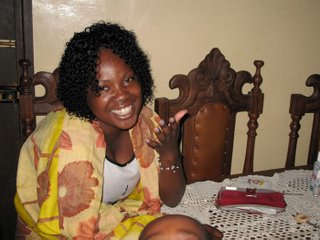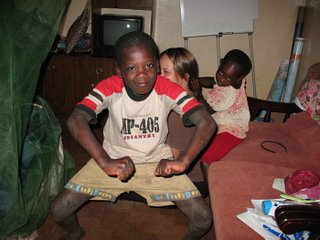One of the first things we learned about when we arrived in country was the idea of Mozambican Time: that things sometimes take much longer in Mozambique than we Americans are used to. If you’ve been checking this blog regularly for updates, and found it lacking, I do apologize, but I blame it on the fact that I’ve become accustomed to Mozambican time. This is a Mozambican blog, after all.
But in all seriousness, I’ve been a little wary of updating this blog until I had a better sense of what was going on here, with me and in Mozambique in general. The first few weeks here were hectic, and if I wrote something here, I risked rushing to conclusions or making stereotypical judgments about Africa in general and Mozambique in particular. I needed a little time to process, to normalize what’s going on, and to not make blanket judgments based on what happened one day, one week, or one month.
That said, it’s hard to believe I’ve been here over a month. Suddenly, things are seeming normal, things like taking a “chapa” around, jammed in with many other people, or looking forward to going to the capital because I’ll finally get to eat something with cheese on or in it.
At the same time, I feel like I’m still processing what’s going on around me, and I’ve only just begun to learn about Mozambique and Mozambican culture. I feel as though things are happening faster than I can keep up with them, so I didn’t want to write anything. But, here it is anyway, some thoughts about my time so far in Mozambique, staying with a host family.
Staying with a host family is inherently difficult, especially when we come from such different cultures with different ideas of independence and family, but all in all I think I lucked out. I have a host sister who’s about my age who understands that I need to leave every once in awhile, go visit friends, walk around, etc. She also takes care of my every need: cooking food that I like, heating the water for my bucket baths, letting me be alone in my room when I need that. It’s a little much sometimes, but I really appreciate all that she does for me. My younger host brother and sister are adorable and I like to play cards with them. They think my Portuguese is funny (which it is), and they are generally full of life and fun. I enjoy them a lot.
My host mom, I think, doesn’t quite know what to do with me. I don’t speak Portuguese well enough to understand everything she says, but she’s finally started to slow herself down to make sure I understand the gist. And it’s true that she’s never had a foreigner staying in her house before—or at least not one like me, and it’s an adjustment process all around. And it’s temporary, so we’re all adjusting just to eventually go our separate ways. I think the homestay, though, is a good idea for Peace Corps volunteers in terms of us learning lots about the culture in a very short time. I appreciate it, at least, as a way to ease into life in this foreign land.
Besides interacting with my host family, my days usually consist of language class and technical training about teaching English. Sometimes we have a session about medical stuff and keeping ourselves healthy and safe in Mozambique, and sometimes we learn about HIV/AIDs here and how to integrate that into teaching English. Recently, we’ve started having sessions about starting boys’ or girls’ clubs at site, and I’m really excited to get to work on something like this (called a “secondary project”). Gender roles and expectations were important and interesting to me in the States, and it’s exciting to know that I can try to bring that to what I’m doing over here. And what am I doing over here? That’s a question I ask myself every day, and the answer changes almost as often. Today, I’m excited to live in Mozambique for the simple fact of being here and experiencing it, to just say that I did it.





